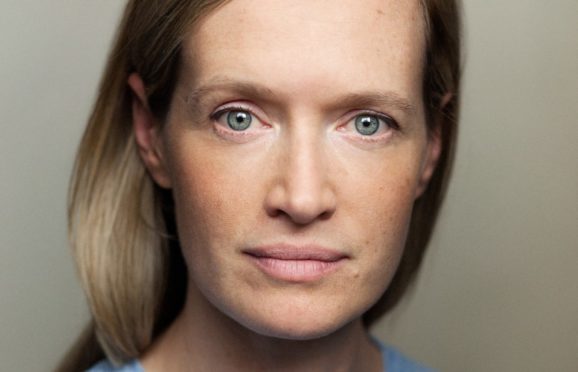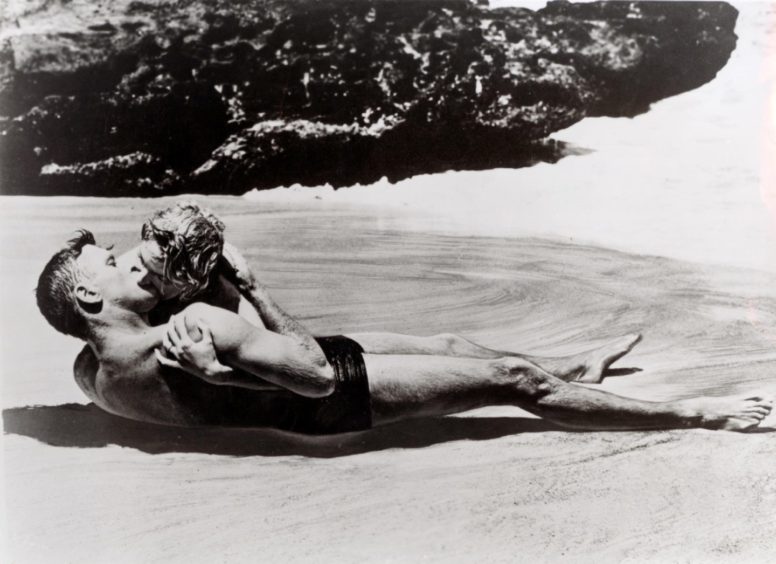
Award-laden actors tearfully thanking everyone from their agent to their hairdresser has become an awards-night delight.
But Michaela Coel, enjoying spectacular success at the Baftas, gave the staple victory speech a twist when she dedicated one of her two big awards for I May Destroy You to the series’s intimacy co-ordinator Ita O’Brien.
It may be a recent addition to the credits but is a job that’s fast becoming one of the most talked about in the entertainment industry where it is expected to become standard to ensure sex scenes are filmed with care and consideration.
Vanessa Coffey is Scotland’s first intimacy co-ordinator and says she has been busy as the country’s on-screen industry starts to recognise this is the way forward when it comes to protecting actors, ensuring directors don’t abuse their power, unwittingly or otherwise.
Coffey – who has worked on sex scenes in a number of high-profile shows, including the second series of War Of The Worlds, Billie Piper comedy I Hate Suzie, Netflix’s Fate: The Winx Saga, Wolfe on Sky, and most recently new Scots comedy drama Float, out on BBC iPlayer later this year – says she fell into the role.
An Australian, she lectures in professional practice at the prestigious Royal Conservatoire of Scotland but came from a background in law and retrained as an actress in on a scholarship at the Conservatoire, formerly RSAMD.
When she started lecturing at RCS, she noticed a growing number of former students coming back to ask for her advice. “Perhaps they had a nudity part or a sex scene,” she said. “They would ask me to look over their contracts and see whether there was something worth negotiating and if I could negotiate on their behalf.”
Coffey officially became an intimacy co-ordinator, overseeing TV, film and theatre, in 2018. “Before then, I didn’t realise there was such a thing,” she said. “It didn’t exist then.”
Around the same time, the #MeToo movement was gaining momentum, following allegations of sexual abuse against Harvey Weinstein.
In the years that followed, many high-profile actresses, including Gwyneth Paltrow and Angelina Jolie spoke out about feeling sexually harassed or abused in the course of their work. More recently, Keira Knightley has said she won’t appear in nude scenes for films that have a male director.
And, last week, Kate Winslet, who starred in one of the most famous nudity scenes for Titanic when she was just 21, said she welcomes the introduction of intimacy co-ordinators, something that didn’t exist at the time.
Celebrities speaking out is all part of the global conversation about boundaries, which is the centre of Coffey’s work. Her role involves working with directors and finding out what they are looking for from a scene, then speaking to the actors for their point of view – and finding out what levels of nudity they are happy with and where they are happy to be touched.
“We literally talk through the scenes and what is involved, things like levels of nudity, kinds of kissing and simulated sex, so that I am really clear in conversations of what is expected and how it can work,” she said.
“We talk about it in detail, so how long kisses will last, how many thrusts in a sex scene, whether or not the characters will orgasm.
“I speak to the directors, producers, camera operators, actors and even costume designers and then choreograph the scene in a way that tells the story they want.”
Coffey is on hand during rehearsals and on the day of the shoot – usually a closed set with just her, the director and the actors – to make sure these conversations are revisited, and that what has been agreed is what happens and appears on screen.
“Before there was such a thing as an intimacy co-ordinator, it was quite often the case that actors would decide between themselves what was going to happen in the scene.
“Or sometimes actors were put on set, the cameras would start to roll and it was a situation of ‘just go for it and see what happens’.” Coffey explained.
“Whereas when I come in, there is never space for actors to just ‘go for it’. My role is to make sure that boundaries aren’t crossed.
“It would never be considered to think about doing a fight scene without a stunt co-ordinator to keep the actors safe and make it look realistic and intimacy scenes should be the same.”
Coffey liaises with the actors afterwards to make sure there’s no impact on their mental health, something particularly important when a scene involves acting out a sexual assault.
Her role is being looked on with increasing importance now within the industry.
“I think the industry is realising it wants to have someone in my role in place for everyone’s safety,” she said, “not just the actors, but the crew as well.
“But, as well as being there for the safety, we are there to help create. We help craft these stories really sensitively. It puts a different perspective on it.
“Before, I think people thought there wasn’t a need but lots of people have come away saying how much better it is. Not just from a physical and emotional safety perspective, but also the positive impact on the story and what this scene means for these characters and moving the plot forward. It is now an integral part of the story.”
Coffey added: “The industry is really looking at itself and thinking how it can make things better for professionals.
“Many actresses have come out about their experiences and talked about sex scenes and being asked to do more than they wanted to.
“It’s very difficult to know when an actor says ‘yes’ to something whether they are actually saying yes, or they are saying it because they want to keep the job.
“And in some cases there has been a suggestion that there was possibly a misuse of power with the director.
“There are some very clear examples of poor behaviour but actors are much more aware of this now. When I came into this job, it wasn’t as busy, but the calls for an intimacy co-ordinator are definitely rising, particularly over the last few months.
“Ironically, since lockdown hit, I have been busier than ever.”
Her role is something Coffey is keen to raise awareness of in young actors.“I talk to students at RCS about intimacy co-ordination in their first year of study,” she said.
“It’s important to get the message out there to the next generation of professionals and make sure they know their boundaries, and whether they can say yes or no – and that they can ask for an intimacy co-ordinator to be brought on board.
“Instilling this knowledge in actors early on is really important. I hope it becomes industry standard.”
It was amazing for everyone to have that voice in the room
Jessica Hardwick has just filmed her first scenes demanding the advice of an intimacy co-ordinator and says the guidance was invaluable.
The 29-year-old, from Melrose, who stars in a new a BBC Scotland production for iPlayer, Float, scheduled to air later this year, said: “There are intimacy scenes, including a bit if nudity, but they were tastefully done.
“I have predominately been in theatre and this was my first TV job – and the first time I have worked with an intimacy co-ordinator. And it was amazing for me – and everyone else on the set – to have that voice in the room.”
Hardwick said having someone to co-ordinate the moves and just use the correct language made intimacy scenes run smoothly and easily.
“It took away the awkwardness of it all and made it practical. Our co-ordinator was the mediator, checking in with everyone.
“She choreographed it so we knew what was expected of us. The best way I can think to describe it is it was like dancing. We knew to hold a kiss for however many beats, or exactly when a hand was going to run down an arm.
“And I knew I was only going to be touched in places I was comfortable to be touched.”
Having everything supervised was also helpful when it came to knowing what was being shot was what had been agreed.
“As an actor on stage, you know all of you is on show, but on screen you never quite know what is in shot,” Hardwick said. “But our co-ordinator could watch the monitor.
“It helped to know someone was there looking out for me.”
She added: “Being a young woman in the industry and hearing the horror stories, it’s really scary. But having that person who takes the worry out of it is amazing.
“I had never done any nudity before but, with the co-ordinator on board, it was a great first experience. In fact, it felt really empowering.
“I am so glad as an actor that these roles are starting to be brought in. It just makes it feel safe and respectful.”
Why Bafta queen hailed the pioneer of intimacy role on TV and film sets
Ita O’Brien’s work on I May Destroy You is something Michaela Coel described as “essential”.
O’Brien was intimacy co-ordinator for the 12-part drama, in which Coel plays a woman trying to remember and come to terms with a sexual assault. And her work, according to Coel, allows actors to “make work about exploitation, loss of respect, about abuse of power, without being exploited or abused in the process.”
In her Bafta acceptance speech, Coel said: “I know what it’s like to shoot without an intimacy director – the messy, embarrassing feeling for the crew, the internal devastation for the actor.”
With a background in dance and acting, O’Brien, who has worked on shows such as Normal People and Sex Education, became a movement coach in 2007, which then led to her developing a set of intimacy guidelines used by all her clients in the TV and film industry.
She pioneered the role of intimacy co-ordinator which is gaining adoption in leading production houses, including HBO, Netflix and the BBC.

Enjoy the convenience of having The Sunday Post delivered as a digital ePaper straight to your smartphone, tablet or computer.
Subscribe for only £5.49 a month and enjoy all the benefits of the printed paper as a digital replica.
Subscribe © Moviestore/Shutterstock
© Moviestore/Shutterstock © Beretta/Sims/Shutterstock
© Beretta/Sims/Shutterstock
 © Scott Garfitt/Shutterstock
© Scott Garfitt/Shutterstock